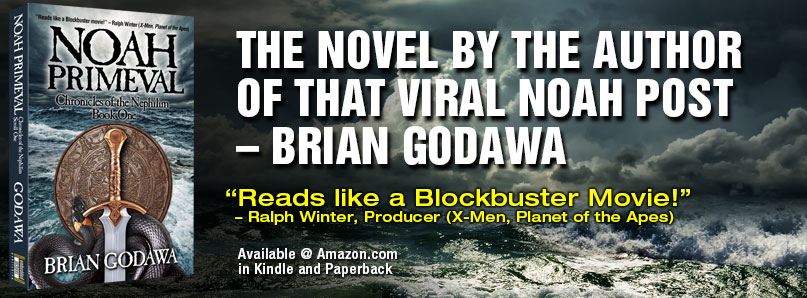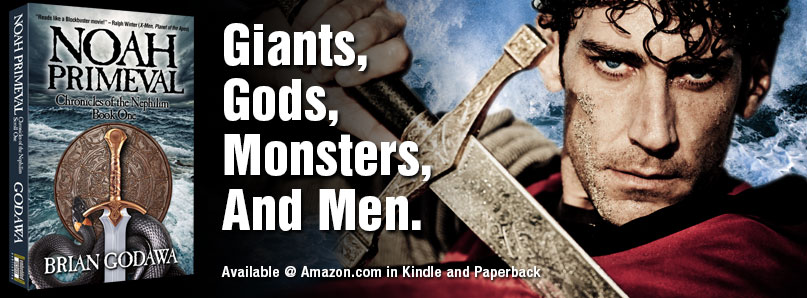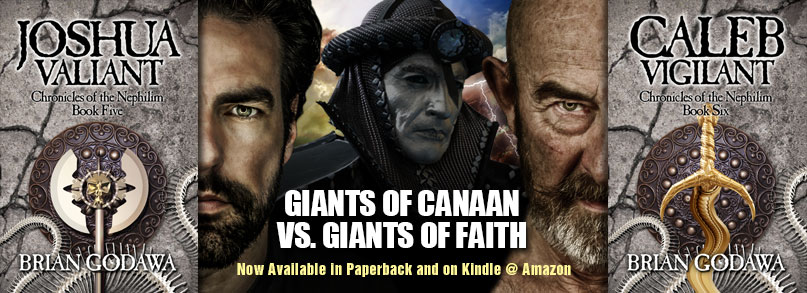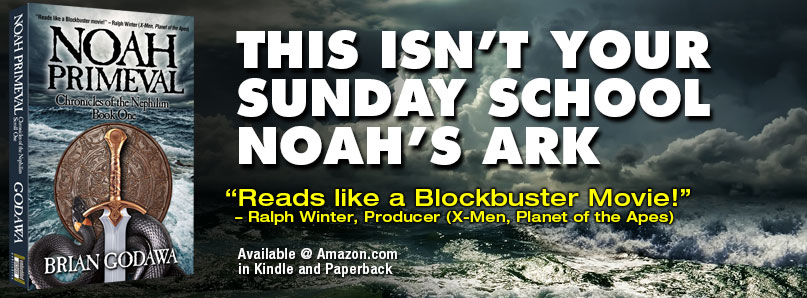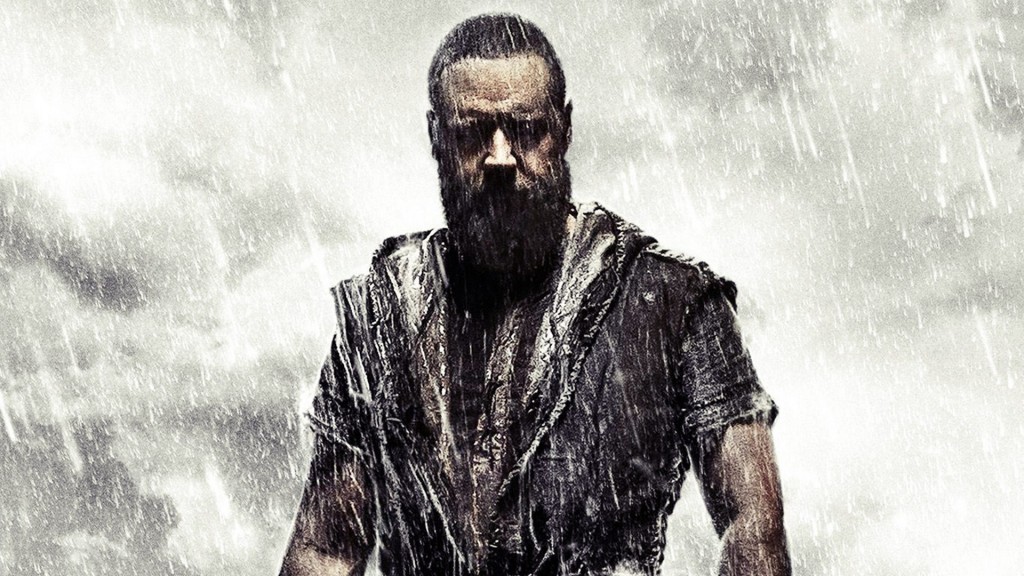
Continuing the conversation about all things Noah, thanks to the upcoming movie with Russell Crowe. I thought I would add some positive elements to the conversation with some factoids and research about the Biblical Noah so you can be prepared to watch the movie with wisdom and discernment.
I’ve written a Biblical fantasy novel called Noah Primeval. I’ve researched this topic extensively. Noah Primeval has been a category bestseller on Amazon for 3 years. It’s first in a series of novels called Chronicles of the Nephilim.
Buy the novel Noah Primeval, here on Amazon.com in Kindle or paperback. The website www.ChroniclesOfTheNephilim.com has tons of way cool free videos, scholarly articles about Watchers and Nephilim Giants, artwork for the series, as well as a sign-up for updates and special deals.
Noah’s Nakedness: It’s Worse Than You Realized. Ham is a Rapist.
I hear the new Noah movie does show Noah getting drunk after the Flood and exposing his nakedness. Well, guess what all you literalists who think Noah should be a sinless character, it’s in the Bible (Gen. 9:20-21). Noah the righteous got drunk. Which means even men considered righteous by God are sinners and blow it. I don’t know what the movie does with this, but there’s so much more to the meaning than a mere scene of Post Traumatic Stress.
In my novel series Chronicles of the Nephilim, Noah’s son Ham rapes his own mother (Noah’s wife) that results in the curse of the fruit of that maternal incest: the child Canaan. This brutal scene is not mere voyeurism of depravity, it is the very theological foundation of the future of Israel. And that foundation is not imagined fantasy, it is the actual Biblical basis of the Jewish claim on the Promised Land of Canaan, as odd and controversial as it may seem. But Genesis is no stranger to odd and controversial stories.
Here is the text from the Bible:
Genesis 9:20–27
Noah began to be a man of the soil, and he planted a vineyard. He drank of the wine and became drunk and lay uncovered in his tent. And Ham, the father of Canaan, saw the nakedness of his father and told his two brothers outside. Then Shem and Japheth took a garment, laid it on both their shoulders, and walked backward and covered the nakedness of their father. Their faces were turned backward, and they did not see their father’s nakedness. When Noah awoke from his wine and knew what his youngest son had done to him, he said, “Cursed be Canaan; a servant of servants shall he be to his brothers.” He also said, “Blessed be the LORD, the God of Shem; and let Canaan be his servant. May God enlarge Japheth, and let him dwell in the tents of Shem, and let Canaan be his servant.”
Literalists have a difficult time with this passage for several reasons. They do not like to admit the fact that Noah becomes a drunk after being the worlds’ greatest Bible hero of that time. They read Genesis 6:9 that says Noah was a righteous man, blameless in his generation, and that he walked with God as being a description of Noah as some kind of moral perfectionist one level less than Jesus. But as explained in the appendix of Noah Primeval, they miss the fact that righteousness was having faith, not moral perfection.
Secondly, having faith was not perfect faith because all Biblical heroes falter in their faith.
Thirdly, “blameless” was a physical Levitical reference to genetic purity (as in “spotless” lamb) that was most likely a reference to being uncorrupted by the fallen Sons of God (more on this in a later post).
Fourthly, walking with God did not mean being sinless. Noah was a sinner with imperfect faith and obedience as every believer is. His broken humanity is how we identify with him and draw our inspiration.
The real problem for literalists who do not consider the ancient Near Eastern poetic language of Genesis is in concluding that an entire nation was cursed simply because one of its forefathers saw his dad without clothes on! While it is technically possible that ancient Mesopotamians had some holy taboo about a parent’s nakedness that we are simply unfamiliar with, there is nowhere else in the Bible that affirms the absurdity of such a taboo.
There are however, several places that explain the concept of “uncovering a father’s nakedness” as a figurative idiom for having sexual intercourse with his wife.
Bergsma and Hahn’s masterful article “Noah’s Nakedness and the Curse of Canaan (Genesis 9:20-27)” elucidated for me the notion that I used in my novel that Ham had forced maternal incest with his mother, Noah’s wife.(1) They explore the different scholarly explanations of “uncovering Noah’s nakedness” and disprove them: voyeurism, castration, and homosexual paternal incest. There are simply no references in the Bible anywhere that reinforce any of these interpretations.
The only one that is reaffirmed and makes sense is that Ham’s uncovering his father’s nakedness was an idiom or euphemism for maternal incest.
They explain that the definitions of uncovering nakedness in Leviticus 18 are tied to the practices of the Canaanites (sound familiar? Canaan is cursed?). And the Biblical text itself explains that in a patriarchal culture, uncovering a man’s nakedness was an expression that actually meant uncovering his wife’s nakedness.
Leviticus 18:7–8
You shall not uncover the nakedness of your father, which is the nakedness of your mother; she is your mother, you shall not uncover her nakedness. You shall not uncover the nakedness of your father’s wife; it is your father’s nakedness.
Likewise, they explain, “Lev 18:14, 16; 20:11, 13, 21 all describe a woman’s nakedness as the nakedness of her husband.”
They then prove that “seeing nakedness” and “uncovering nakedness” are equivalent phrases and are the usual expressions of sexual intercourse in the Holiness Code of Leviticus (18:6; 20:17). It could not be more explicit than Deuteronomy 27:20:
Deuteronomy 27:20
‘Cursed be anyone who lies with his father’s wife, because he has uncovered his father’s nakedness.’
Biblically, “uncovering a man’s nakedness” was an idiom for having sexual intercourse with his wife.
What then of Shem and Japheth walking backward so as not to see Noah’s nakedness? Surely, this is not a reference to avoiding maternal incest, but a literal covering of Noah’s body with a cloak?
In that case, the literal and the figurative collide in a metaphor of meaning. The authors explain the apparent incongruity this way:
The brothers’ actions play on the broader meaning of the phrase. Not only did the brothers not “see their father’s nakedness” in the sense of having intercourse with him, but also they did not even dare to “see their father’s nakedness” in a literal sense. Where Ham’s act was exceedingly evil, their gesture was exceedingly pious and noble. (2)
The final clincher to making sense of this bizarre passage is the curse of the son Canaan. Throughout Genesis 9, Ham is oddly and repeatedly referred to as the father of Canaan. It is a strange repetition that draws attention to itself and is finally climaxed with Canaan being cursed instead of Ham for Ham’s dirty deed.
Well, if Canaan was the fruit of that illicit union of maternal incest between Ham and Emzara, it makes perfect sense within that culture that he is cursed. It may not sound kind to our modern ears, but it is perfectly consistent with that Biblical time period.
Ham sought to usurp his father’s patriarchal authority through maternal incest which was “uncovering his nakedness.” The fruit of that action, the son Canaan, is a cursed man. And that cursed man is the forefather of a cursed nation. Remember, in the ancient world, family bloodlines were all about survival and keeping them protected.
The writer of Genesis, whether Moses or a later editor, was clearly showing the origins of the evil curse on the land of Canaan that they were about to take from the Canaanites. Canaan was cursed to be a servant of the Shemites, or Semites of Israel, and that one justification of their conquest of the Promised Land.
In short, the Canaanites are the Seed of the Serpent at war with the Israelites, the Seed of Eve (more on this in upcoming posts), and they deserve to be dispossessed of their land by the God whom their ancestors rejected and by whom they were cursed.
Of course, there is much more to the story than that, for there were giants in the land of Canaan as well, giants that were the descendants of the Nephilim, the original Seed of the Serpent.
I tell this story in the novels Joshua Valiant and Caleb Vigilant to see how that all fits together. But what is this “Seed of the Serpent” thing? Look for the next post for an introduction to the Giants.
Buy Noah Primeval to read more of this interesting Biblical research about all things Noah, and for a well-researched retelling of the War of the Seed of the Serpent with the Seed of Eve. It will make the Bible stories come alive like never before.
Buy the novel Noah Primeval, here on Amazon.com in Kindle or paperback. The website www.ChroniclesOfTheNephilim.com has tons of way cool free videos, scholarly articles about Watchers and Nephilim Giants, artwork for the series, as well as a sign-up for updates and special deals.
FOOTNOTES
(1) John Sietze Bergsma, Scott Walker Hahn, “Noah’s Nakedness and the Curse on Canaan (Genesis 9:20–27)”, Journal of Biblical Literature 124 (2005): 25, ed. Gail R. O’Day, 25 (Decatur, GA: Society of Biblical Literature, 2005).
(2) Bergsma, Hahn, “Noah’s Nakedness,” 33.

